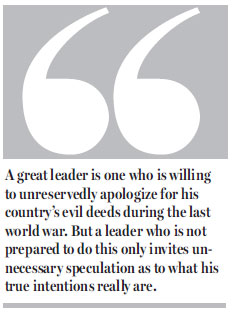Prime Minister Shinzo Abe should apologize for Japan's war crimes
Updated: 2015-08-14 07:52
By Andrew Sheng(HK Edition)
|
|||||||||
The months of August and September commemorate the 70th anniversary of the end of the World War II, the largest conflict in human history. Most people remember the atomic bombing of Hiroshima on Aug 6 and Nagasaki on Aug 9, prompting the Japanese emperor to announce on radio Japan's unconditional surrender on Aug 15 and the official signing on board the USS Missouri on Sept 2, 1945.
The Western timeline of the World War II was from Sept 1, 1939 to Sept 2, 1945, exactly six years and one day. But the Asian memory of that conflict goes back earlier to July 7, 1937 when the Japanese army fought with Chinese troops at Marco Polo Bridge outside Beijing, leading to outright war and the subsequent massacre in Nanjing.
History forces us to look back and ask what we have learnt from such horrific events. War, as the German strategist Carl von Clausewitz stated, is the continuation of politics by other means. Unfortunately, "other means" often meant the wanton killing of innocents and the destruction of the existing order.
The outcome of World War II was a period of unprecedented peace and prosperity. The two main protagonists took different paths. Germany forswore arms and embraced Europe, and has today emerged as an economic and even a political leader of Europe. Japan became the second largest economic power, but her political leadership in Asia was never fully accepted because of doubts about whether she ever truly repented.
It has not helped that Prime Minister Shinzo Abe is proposing to amend the Japanese constitution, and is once again rebuilding Japan's armed forces. I was personally shocked to read that the latest state-of-the art Japanese Izumo-class helicopter destroyers, ostensibly for defensive purposes, are as long and heavy as the famous Soryu and Hiryu aircraft carriers lost in the Battle of Midway.
Geo-strategist George Friedman, probably one of the most clear-eyed commentators on global security, commented recently that there were two moral lessons from Hiroshima: "The first is that military doctrine, like other things, is ruthlessly logical. The second is that in confronting Germany and Japan, moral purity was impossible, save for the end being pursued, which was destroying the prior evil."
The uncomfortable truth is that Japanese rearming and increased defense spending by all powers in the Pacific (for whatever reasons, right and wrong) have one logical conclusion - World War III, which will be nuclear, because Japan is for all intents and purposes a nuclear power.
The other moral issue is that one always tends to see evil in the other person, but never in oneself.
Evil deeds are often done supposedly with good intentions. The victims pay for such deeds with their lives. The living try to make sense of it all, and perhaps hope such deeds are never repeated.
Which is why I will watch, with great attention, for Abe to apologize or express remorse on the forthcoming anniversary. So far, he mouths what appear to be the right words, expressing some remorse or condolences for those who have departed. He seems to imply that previous prime ministers have already given formal apologies, so he has no need to repeat official apologies.
But if you think through what he has said so far, remorse and condolences were never really offered to the dead. They are given to those who are living and who remain with the pain of loss.
A great leader is one who is willing to unreservedly apologize for his country's evil deeds during the last world war. But a leader who is not prepared to do this only invites unnecessary speculation as to what his true intentions really are.
Abe is in many ways the right leader to apologize for the great wrongs of the past, because members of his family were leaders during the war era.
We just hope that he will do the right thing.
The author is a distinguished fellow of Asia Global Institute, Hong Kong. His comments on global and Asian issues have appeared in the leading publications.

(HK Edition 08/14/2015 page9)